CRI实用英语课堂 Unit 55 Hawaii, the Paradise 人间天堂夏威夷
搜索关注在线英语听力室公众号:tingroom,领取免费英语资料大礼包。
(单词翻译)
Part 1 A Brief Introduction to Hawaii 夏威夷群岛简介
The Hawaiian island chain began around 10 billion years ago with the form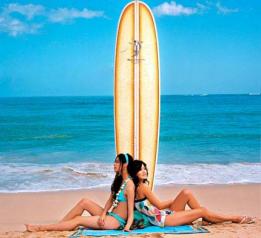 ation of Kauai and Niihau. The islands are a result of the movement of the Pacific Plate, one of Earth's tectonic plates, over a hot spot. A hot spot is a place where molten rock escapes through the crust, like a volcano.
ation of Kauai and Niihau. The islands are a result of the movement of the Pacific Plate, one of Earth's tectonic plates, over a hot spot. A hot spot is a place where molten rock escapes through the crust, like a volcano.
Eventually, the build-up of magma from the ocean floor will reach sea level to create an island. Over time, the hot spot will die down as the Pacific Plate continues to move. This movement offers a new place to create another island if the hot spot returns to activity.
Over thousands of years, the hard lava1 rock deteriorates2, allowing for plants to thrive and animals to survive.
The natives of the Hawaiian Islands came from clusters of people referred to presently as Polynesians. Polynesians originated from Southeast Asia, but their history cannot be completely traced. They were great navigators and settled numerous islands in the Pacific Ocean, from New Zealand to Easter Island and Hawaii, the most northern and last to be settled. This expansive area of islands is called the Polynesian Triangle.
The Hawaiian Islands were again discovered by Captain James Cook of England in 1778. About a year later in 1779, Cook returned to Hawaii only to create a series of misfortunate incidents - events, which led to his untimely death at the hand of natives. The warring state of the islands at the time of Cook's arrival did not help the circumstance. Hawaii was more or less divided into three kingdoms at Cook's advent3. King Kamehameha, who was present at Cook's visits, worked hard to unite all the islands of Hawaii under one rule by 1810.
King Kamehameha's death marked the decline of the kapu system and many other traditional values. These values were manipulated by Christian4 missionaries5, who sought to save what they considered the heathen souls of the natives. The first boat of missionaries arrived in 1820 and by 1823 the first mission was founded in Lahaina. It wasn't long before many natives converted to Christianity. The greatest threat to the missionary6 effort was not locals, but the whale and merchant ships. These ships brought drunken and lustful7 men. Lahaina was the busiest port of the area during this time. It would be Hawaii's present capitol, but Kamehameha III ultimately moved it to Honolulu.
Landownership was a foreign concept to native Hawaiians. Efforts were attempted by Kamehameha III to divide the land and make it possible to formally acquire it. This system and the natives' inexperience were abused by whites. Since that decree, Hawaiian lands have swiftly fallen to foreigners. Many Europeans set up plantations9 on their newly stifled10 land to grow sugar cane11 and pineapple. However, there was not enough local labor12 due to disease brought by outsiders. By the 1850s, the native population was reduced to one fifth.
The last of the Hawaiian monarchs13 was Lydia Liliuokalani, who was of royal blood but not of Kamehameha lineage. Her reign8 began in 1891 and was short lived. It ended in 1893 as a result of a coup14 supported by sugar growers and undoubtedly15 the U.S. government. A new provisional government was put into place. Most natives were prevented from voting and were powerless against the U.S.' ultimate goal of annexation16 in 1898.
The military became as significant to Hawaii as Hawaii was central to the military. The military took over the economy providing money and jobs. As a result of the bombing of Pearl Harbor on December 7, 1941, more mainlanders considered Hawaii perpetually bound to the U.S. More locals also considered themselves American and created a greater movement for statehood. It took several years for Hawaii to become the 50th state in 1959.
The 1960s brought about the era of the tourists through the revolution of the passenger airplane. Today, more than 6 million visitors per year come to Hawaii to bask17 in the aloha spirit of the islands.
夏威夷群岛的天然环境非常迷人,属于火山岛,地形崎岖不平;拥有美丽的海滩,从白色的沙滩一直到黑色土质的沙滩都有。地形与地质的变化也非常大,不论从低地沙漠一直到高耸的山顶,或是从贫瘠的火山岩到热带雨林区,在夏威夷群岛上,通通都看得到。
夏威夷群岛也是全世界位置最孤立的岛群,距离最近的大陆地也有2500英哩远。正因为这样的孤立,也为夏威夷带来保持生态完整的好处,在这里的上千种动植物种类,有90%以上,在地球上其它地方,已经看不到了。
这里的地质结构也是独一无二的,这里有全世界最活跃的活火山,也有最大的死火山哈力卡拉(Haleakala);同时也有最高的摩纳其山(Mauna Kea)和悬崖。这里的观光旅游业非常发达,旅馆如雨后春笋越来越多,海滩上总是挤满了人,这不过只是夏威夷的面貌之一;你还是可以找到非观光热门地区,也有人少偏僻的海滩可以探险,住宿的选择也有内陆的小屋或孤立偏远的住处。
在岛上健行或在野外地区逍遥自在的旅行,是完全不用付费的。夏威夷群岛有世界顶尖的冲浪、玩风浪板地点,像瓦胡岛就是全世界最棒的冲浪地;当然,游泳、潜水也是这里最热门的水上运动。
在到夏威夷旅游度假的人们心中,最有吸引力的莫过于海滨浴场。其中最热闹、最闻名的是怀基基海滩,远处碧海蓝天,白云悠悠,近处椰林婆娑,金黄的沙滩,滔滔的白浪,令人感到无限的心旷神怡。
怀基基海滩以巨浪闻名,相传当年土著国王和酋长们常在此举行冲浪比赛,冲浪运动由此发端走向世界。
在气候上,因为整年都有凉流吹过,所以夏威夷一年四季都非常宜人舒适;通常大白天的阵雨来得急也去得快,紧接着马上就雨过天晴,天空中还会出现绚丽的彩虹。瓦胡岛(Oahu)是群岛里人口最密、发展最多的岛,光是欧胡岛上的旅馆数,就占了全夏威夷旅馆数的一半。 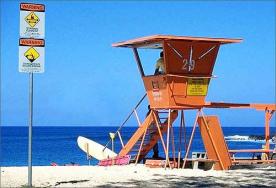
在檀香山 Honolulu,可以体会得到都市生活的好处与坏处,这里有很棒的博物馆、活跃的夜生活,还有好吃不贵的各种美食,但也一样免不了都市的通病-塞车。毛伊岛(Maui)是仅次于瓦胡岛,发展第二的岛,也是赏座头鲸的好地方。至于大岛(Big Island),则有雪跟活火山,两样在夏威夷其它岛上所没有的地理特色;考爱岛(Kauai)拥有全夏威夷最青绿茂密的植物景色。
夏威夷原是一个王国,1898年被美国吞并,1959年夏威夷归入美国版图,成为星条旗上的第50颗星。
夏威夷群岛的人民约80%是黑头发、黄皮肤的东方人,以致给来岛的游客第一个印象,仿佛是已到了东方。
第二个给人深刻印象的便是遐迩闻名的夏威夷衫,那色调鲜艳而浓郁的衬衫正配合着夏威夷亮丽热烈的南海风光。而当地妇女套穿的拖地长裙,既无曲线,又无纽扣,但却格外显得舒适和潇洒,而更具风情。
Part 2 Have Fun at Hawaii 畅游夏威夷
Dialogue Script 1 对话原文 1
Lisa: Aloha! I have a lei to welcome you to paradise.
Ben: Huh? I don't see any cuties around. 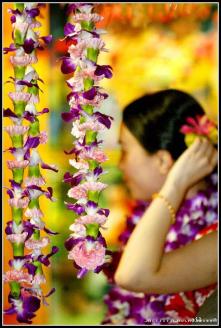
Lisa: No, silly! Not that kind of "lay". This lei is a necklace made of Hawaiian flowers!
Ben: Thanks. I was just kidding, you know. The islands look so beautiful from the air.
Lisa: And they look even more lush from the ground.
Ben: Well, after the Mormon Utah desert, I can use as much as lushness as I can get.
讲解:
1. 对话中,Lisa在机场迎接Ben的到来,Ben是到夏威夷来度假的。见到了Ben,Lisa热情地说了一声,Aloha!这是夏威夷土著的语言,不管见面问好还是说再见的时候都可以用到,夏威夷州的别名,Aloha State也因此而得名。
2. Lisa说,I have a lei to welcome you to paradise. 我带了一个可爱的东西来欢迎你到天堂。这里的paradise就是指夏威夷了。lei是指“花环”,当你乘着飞机抵达檀香山,通常一走出机场,就会看见热情的夏威夷女郎喊着Aloha,手里拿着一串花环,lei,往游客的脖子上套,不过这些lei可是要付费才能带走的纪念品哦。
3. 但是Ben故意打岔,把lei听成了lay,这个词,l-a-y,发音跟l-e-I是一样的,但是两个词的意思可是相差十万八千里,lay是指“性伴侣”,而不是指带在脖子上的夏威夷花环。所以Ben跟Lisa开玩笑说,我怎么没看见你身边有漂亮姑娘啊。cutie是cute的名词形式,表示“可人,长的漂亮的人”。
4. Lisa骂Ben是小笨蛋,不是那种“女伴”,而是这种用夏威夷花卉做成的项链。Ben赶忙道谢,并解释说,自己是在开玩笑呢。Ben赞叹说,从飞机上看夏威夷群岛真是漂亮极了。Lsia说夏威夷群岛从地上看也是绿意盎然。lush这个词表示“苍翠的”,名词形式是lushness,表示“翠绿”。
5. Ben听了很高兴,说在经历了摩门尤他州的沙漠之后,再多的绿意我也不嫌多。I can use...这个句型表示“我需要...”,比如说,Now I can use some cash. 现在我需要一些现钞。
Dialogue Script 2 对话原文 2
Lisa: I think you should start with a sweet tropical cocktail18.
Ben: You've really said the magic word, Lisa. It wasn't just coffee I had to abstain19 from in Salt Lake.
Lisa: Coconuts20 will help you get into that aloha spirit.
Ben: Great! Order me a fresh pina colada, followed by a strawberry daiquiri. Mmmmmmm!
Lisa: And then we'll get you in the water!
Ben: But I don't know how to swim.
Lisa: You'll just have to learn then! 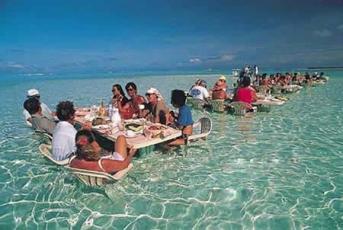
讲解:
1. 对话中,Ben和Lisa来到了怀基基海滩的一家酒吧。怀基基海滩,Waikiki是世界闻名的旅游胜地。Lisa建议Ben先来一杯香甜的热带鸡尾酒,就是a sweet tropical cocktail。这正合Ben的心意,因为他在盐湖城连咖啡都不能喝,更别说鸡尾酒了。
2. magic word,我们前面也讲过,原来表示“咒语”,You've really said the magic word.你说的正合我意。abstain from sth 表示“避开戒掉某物”。Lisa说椰子可以让人充分感染夏威夷的欢乐气息,就是aloha spirit。
3. Ben点了一杯新鲜的果汁朗姆冰酒,a fresh pina colada。pina colada 这种酒是由朗姆酒、菠萝汁、椰奶和牛奶调制而成的,最后再放进去一片菠萝当装饰就成了。
4. 一杯还不够,Ben又点了strawberry daiquiri,就是“草莓代基里”,是由新鲜的草莓、朗姆酒、莱姆汁,草莓甜酒、红石榴汁,加上细糖和碎冰制成。到夏威夷享受热带风情的人一定不要错过这两种充满热带气息的鸡尾酒。
Dialogue Script 3 对话原文 3
Jenny: You two from around here?
Ben: She is, but I'm just a tourist.
Jenny: So will you be in Oahu your whole trip?
Ben: I'm not sure yet. Lisa here said something about going to another island.
Jenny: The Big Island has some killer21 volcanoes, but Kauai...I've heard some crazy stories about the place.
Ben: Like what?
Jenny: Like...there's a community of people who live there. In between the beach and the mountains!
Ben: All the islands have people between the beach and the mountains.
Jenny: But this one is different. They live on wild fruit tree, and grow lots of weed. It's like paradise!
Ben: This all sounds kind of like that movie, The Beach.
Jenny: Maybe, but his place is for real. Go check it out and let me know! Time for me to hit the surf!
讲解:
1. 对话中,Jenny过来跟Lisa 和Ben搭话,问他们是不是整个行程都会在瓦胡岛呢?瓦胡岛的名称Oahu有“聚集”之意,岛上果然聚集了八成以上的夏威夷人,国际机场和主要旅游点Pearl Harbor珍珠港等都集中在这里。
2. Ben也不知道他们是否会一直留在瓦胡岛,Lisa说过可能要去一个另外的岛屿。Jenny告诉Ben在The Big Island大岛上分布着一些迷人的火山,killer这里的意思是“迷人的人或事物”。但是当说到Kauai考爱岛的时候,Jenny就欲言又止了。她神神密密地告诉Ben,她听说了一些关于考爱岛的疯狂传说。
3. Ben很好奇,Like what?比如说什么刺激的故事呢?Jenny告诉他考爱岛上住着一群人,在海滩和山区之间。Ben听了觉得很可笑,在夏威夷每个岛都有人住在海滩和山区之间啊,这有什么可稀奇的。Jenny说这一个可不一样,这些人以野生果树的果实为生,而且种了大麻,就像在天堂一样。weed是一个俚语词汇,是“大麻”的意思。
4. Ben听了觉得就像Beach《海滩》这部电影里情节一样,这部电影描述了一位美国观光客到泰国度假,偶然从陌生人手中得到地图,按照这张地图找到了传说中的美丽海滩。Jenny说电影里的情节是虚构的,但是她说的岛屿可是真的,还建议Ben去亲眼看一看。然后就去冲浪了。for real ,意思是“真的,当真”。
Dialogue Script 4 对话原文 4
Lisa: Kauai does sound beautiful though. I've always wanted to hike the Kalalau Trail.
Ben: I read about that! Cliffs and waterfalls and fruit trees! I have a couple of weeks. Yeah, let's do it!
Lisa: OK. I think I can get the time off. But let's explore all of Oahu first.
Ben: Cool. Let's go to Pearl Harbor later today then.
Lisa: Alright. But let's play a little first. If you're not going to get in the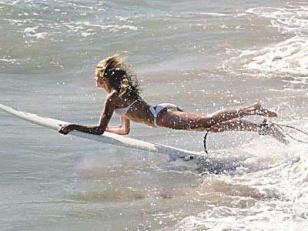 water, you at least better get in the air. (points at a parasailer)
water, you at least better get in the air. (points at a parasailer)
讲解:
1. Lisa说考爱岛听别人描述确实很美,而且她一直都想去走走卡拉劳步道。考爱岛是夏威夷人心目中最美的岛,高耸的峭壁直接落入海平面,也拥有壮丽的Kalalau Trail卡拉劳步道。
2. Ben说他也在书上读到过这个地方,那里有悬崖、瀑布和果树!他还有两周的假期,完全可以去考爱到玩一玩。Jenny正好也可以休个假,get the time off就是“休假”的意思。
3. 但是Lisa提议先把他们所在的瓦胡岛玩遍了再说。Ben提议去珍珠港参观。Lisa想在海滩上先玩一会再去,如果Ben不下水游泳的话,至少得到天空上去,说完Lisa指了指滑翔伞手。parasailer就是操纵滑翔伞的人。
Dialogue Script 5 对话原文 5
(A few hours later, at Pearl Harbor)
Ben: Hawaii is nothing like Utah. Are you sure this is the same country?
Lisa: Hawaii is really unique. Last state in the union. The only island state. No rac ial majority.
ial majority.
Ben: No majority? Everyone here looks Asian to me.
Lisa: Some of those are native Hawaiians. Some are Japanese, Filipino, Chinese, Fijian, Tongan. Twenty-four percent is white, but really, everyone's just all mixed up here.
Ben: I guess you fit right in here, being half Japanese and half white.
Lisa: There's even a Hawaiian word for that! I'm a hapa. You know, being half-Japanese, I always feel kind of weird22 coming here.
Ben: But everyone in Hawaii looks Japanese. Anyway, people must accept history by now.
Lisa: But so many people died here. Look at this ship, the USS Arizona. Thousands just sank with it.
Ben: That had nothing to do with you, Lisa.
Lisa: I know, I know. You know, looking out at the sea from here, I can't wait to go to Kauai.
Ben: Cool. Let's go start packing then!
讲解:
1. 对话中,Lisa和Ben来到了珍珠港军事基地参观。Ben觉得夏威夷一点都不想尤他州,感觉就像来到了一个别的国家。Lisa解释说,夏威夷真的很独特,它是美国的最后一个州,也是唯一的州岛,而且没有多数民族。majority是“多数”的意思,它的反义词是minority,ethnic minorities就是“少数民族”的意思。
2. Ben觉得很奇怪,因为这里所有人在他看来都像是亚洲人。Lisa说这里有一部分是夏威夷原住民,有些是日本人、菲律宾人、中国人、斐济人和汤加人。这里24%的人口是白人,但事实上,这里每个人都是混血儿。要说一下的是,在夏威夷语中,haole,就是指在夏威夷的白人。
3. 所以Ben说Lisa很适合生活在夏威夷,因为她是一半日本人,一半白人,half Japanese and half white。在夏威夷语当中,还有一个专门的词来表示这种“混血儿”,就是hapa。身为半个日本人,Lisa总觉得来到珍珠港军事基地怪怪的。
4. 1941年12月7,日本偷袭“珍珠港”Pearl Harbor,美国太平洋舰队损失惨重,44艘舰船被击沉,共有2000多名军民死于这次偷袭行动,仅“亚利桑那号” the USS Arizona这一艘战舰,就有1200多名官兵遇难。Lisa也在后面的对话中提到。
5. 所以Lisa来到珍珠港的时候就觉得weird怪怪的。Ben安慰她说,不要多想,这里每个人看起来都像日本人,而且人们到现在一定要正视和接受历史了。Lisa也知道是这样的,但是一想到有这么多人死了,她就很难过。
6. Ben说日军偷袭珍珠港跟Lisa一点关系也没有,就不要自责了。have nothing to do with sb or sth 表示“跟某人或者某物没有关系”,那么have something to do with sb or sth就可以表示“跟某人或者某物有关”了。
7. Lisa也明白其中的道理。她转移了话题,让Ben看向大海,从他们的位置看考爱岛,觉得它更美了。Ben兴奋不已,嚷着现在就回去打包,就是pack这个词,比如说,I've already finished packing. 我已经打完包了。
Dialogue Script 6 对话原文 6
Ben: We'd like a permit for camping in the Na Pali Coast. Three days.
Ranger23: Are you sure you're in shape for the trail? The Sierra Club gives it a nine out of ten for difficulty.
Ben: I just came here from a climbing trip in Utah. I can handle everything.
Ranger: Use your head. You know what 'pali' means, don't you?
Ben: Umm, not exactly. I'm not local.
Ranger: It means cliffs. And that's what you'll be hiking along. Sheer cliffs. But you've never been anywhere more beautiful.
讲解:
1. 对话中,Ben和Lisa来到护林员这里领取到纳帕里海岸Na Pali Coast三天的露营许可证。permit就是“许可,许可证”。护林员,就是ranger,疑惑地问他们是否能够受得了到那里露营,因为纳帕里海岸的地势非常险恶。be in shape 表示“处于良好的健康状况”,比如说,You'll never be in shape until you eat healthy food and take some exercise. 只有吃健康食物,做运动才能保持身体的最佳状态。
2. 跟be in shape相对的就是be out of shape,“不健康的”,比如说,Take exercise if you're out of shape.如果身体不好就要锻炼。纳帕里海岸的地势非常险恶,山岳协会给那里难度9的评分,nine out of ten for sth表示“以十级来分,到第9级了”,一般人还真受不了这里的环境。
3. Ben很自信,说他才从尤他州登山回来,应该什么都应付得来。handle就是“应付,对付”的意思。护林员很不以为然,他说Use your head. You know what 'pali' means, don't you? 考虑一下吧,你知道“pali”的意思吗?
4. use your head 字面上的意思是“用用你的脑子吧”,建议对方多考虑一会的时候就可以用。比如说,---I've had five beers already. Want a ride home? ---No! Use your head. Don't drink and drive. ---我已经喝了5瓶啤酒了,要搭我的便车回家吗?---不!想清楚好不好,喝酒不能开车。
5. 那么pali是什么意思呢?在夏威夷语里,pali是“悬崖”的意思,就是Ben 和Lisa要走的步道,都是险峻的峭壁,不过那里的风景是无与伦比的。sheer的意思是“陡峭的”。美景当然是诱惑人的,不过首先还是要注意安全。
 收听单词发音
收听单词发音 




